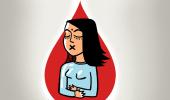Changes in hormone levels often result in mood swings, anxiety and/or depression, causing erosion in self-esteem, body image perception and a general disinterest in sex in most women, says Dr Gandhali Deorukhkar, consultant-obstetrics and gynaecology, Wockhardt Hospitals, Mumbai.
- How to control menopause mood swings? Ask rediffGURUS HERE.

One of the most significant transitions that any woman faces is menopause.
It brings about an array of physical and emotional changes, particularly regarding libido and sexual health.
With fluctuating hormonal balances, many women have reported changes in their sex drives and in their need for intimacy.
Dealing with fluctuating hormones
Changes in hormones -- especially in the oestrogen and testosterone levels -- are a big factor behind this shift.
While they decrease in postmenopausal years, oestrogen is necessary for the maintenance of vaginal health, lubrication and elasticity; testosterone, though present in women in smaller amounts, controls sexual desire.
When these hormones drop, women lose their libidinous sex drive, face dry vaginal problems and are unable to be aroused easily, thereby causing them pain or discomfort during sexual intercourse.
Emotional, psychological factors
Besides hormonal changes, emotional and psychological factors also determine the pace at which the libido drops.
Changes in hormone levels often bring about mood swings, anxiety or depression, causing an erosion in self-esteem, body image perception and a general disinterest in sex in most women.
This environment is often characterised by weight gain and a feeling of being less attractive. Other changes like hot flashes, night sweats, fatigue and sleep disturbances may also lead to a drop in sexual interest.
Impact of chronic disorders
Chronic conditions like arthritis or cardiovascular disorders may manifest with age and make sexual activity more problematic.
To help develop emotional intimacy as well as to maintain a healthy sex life during and after menopause, talk openly and honestly with your partner about changes in your sexual desire, feelings of discomfort or decreased desire.
Vaginal dryness
Another cause for painful intercourse is vaginal dryness. Lubricants -- water- or silicone-based -- will remove all friction, making sex bearable.
Vaginal moisturisers can be effective as well.
For more serious cases, a doctor might prescribe prescription oestrogen creams or other types of hormonal treatments to restore vaginal health.
Non-sexual intimacy
Menopause can become an opportunity for new kinds of intimacy too.
Intimacy may be sustained through sensual touches, massages, cuddling and other affectionate gestures.
Non-sexual intimacy also reduces pressure and leads to an enhanced emotional connection, keeping the intimacy alive even if the sex is less intimate.
The importance of exercise
Being active and exercising boosts the libido because it increases blood flow, enhances energy levels and relieves menopausal symptoms like fatigue and mood swings.
It also helps tone the body and a woman who is confident about her body will look at contributing to her sexual life positively.
Furthermore, exercises that target the pelvic floor strengthen the muscles surrounding the vagina, thereby enhancing sensibility during cohabitation and reducing problems such as urinary incontinence.
A healthy diet
A healthy diet is another component that aids in enhanced sexual wellness during menopause.
A balanced diet rich in fruits, vegetables, lean proteins and whole grains maintains one's overall health; it also helps regulate weight, thus boosting overall self-esteem and energy levels.
Foods with high phytoestrogen include soy products, flaxseeds and legumes.
Omega-3 fatty acids found in fish help elevate one's mood and general well-being.
Hormone replacement therapy
Low libido and vaginal dryness can be controlled with HRT (hormone replacement therapy). HRT includes supplements of oestrogen and often progesterone as well. However, HRT is not suitable for everyone.
Before you begin this treatment, discuss the risks and benefits with a healthcare provider.
Stress management is equally important; stress, anxiety and depression are libido-reducing agents.
Yoga, meditation and deep breathing can all assist in relieving stress, healing mental ailments and stimulating sexuality.
Experiment with your schedule
Another tip is experimenting with the time at which you decide to indulge in intimacy.
Fatigue and low energy are quite typical because of menopause; therefore, trying to initiate intimate actions when you are feeling energised makes a big difference.
You will need to adjust the schedule so you have time to be intimate in the morning or after you have taken a nap.
Seek medical intervention
If menopause is interfering with your sex life, you should seek medical consultation.
A healthcare provider can give you individualised guidance -- it could be prescriptions for medication to treat vaginal dryness or a recommendation for HRT or testosterone therapy if appropriate.
Menopause brings about many changes in a woman's body, some of which are changes in libido and sexual health; if openly discussed, lifestyle changes and medical support can help women maintain a fulfilling sex life.
Understanding these changes and being proactive about managing menopausal symptoms will help women maintain both physical and emotional intimacy, ensuring a healthy and satisfying relationship in the years beyond menopause.
- How to control menopause mood swings? Ask rediffGURUS HERE
Disclaimer: All content and media herein is written and published online for informational purposes only. It is not a substitute for professional medical advice. It should not be relied on as your only source for advice.
Please always seek the guidance of your doctor or a qualified health professional with any questions you may have regarding your health or a medical condition. Do not ever disregard the advice of a medical professional, or delay in seeking it because of something you have read herein.
If you believe you may have a medical or mental health emergency, please call your doctor, go to the nearest hospital, or call emergency services or emergency helplines immediately. If you choose to rely on any information provided herein, you do so solely at your own risk.
Opinions expressed herein cannot necessarily provide advice to fit the exact specifics of the issues of the person requesting advice.











 © 2025
© 2025